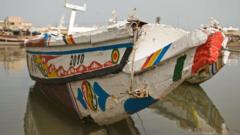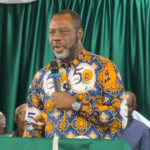At least 26 people have died after a boat carrying migrants capsized off Senegal’s coast.
Authorities say more than 100 people were on board the wooden fishing vessel when it sank just 4km (2.5 miles) into its journey.
Distraught relatives and friends have gathered along the beach, anxiously waiting for news of their loved ones.
So far, four people have been rescued and search efforts are still under way.
The boat had departed from Mbour, about 80km south of the capital city Dakar, bound for Spain’s Canary Islands, which are off the coast of West Africa.
In recent years, the number of migrants leaving West Africa through Senegal has surged.
Mostly young men – fleeing conflict, poverty, and unemployment – are attempting the dangerous Atlantic route to the Spanish Islands, with nearly 30,000 arrivals recorded this year.
Spain is one of the European countries that takes in the most migrants, and the Mediterranean Sea route remains the most popular.
But a growing number of West African migrants are choosing to travel via the Atlantic Ocean to the Canary Islands instead.
Despite the dangers, it involves just one step, rather than needing to cross both the Sahara Desert and the Mediterranean.
The surge in migrants attempting the crossing prompted Spain’s prime minister to visit three West African countries last month – Senegal, Mauritania and The Gambia – for crisis talks with leaders.
Earlier this year, a $227m deal was made between the EU and Mauritania to bolster border security. Spain was a key partner in the talks in Mauritania that had led to it.
Go to BBCAfrica.com, external for more news from the African continent.
Follow us on Twitter @BBCAfrica, external, on Facebook at BBC Africa, external or on Instagram at bbcafrica, external
















